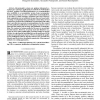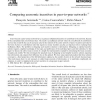1260 search results - page 208 / 252 » Bipolar Preference Problems |
TSMC
2008
14 years 11 months ago
2008
Abstract--Recommender systems are gaining widespread acceptance in e-commerce applications to confront the "information overload" problem. Providing justification to a re...
CN
2004
14 years 11 months ago
2004
Users who join a peer-to-peer network have, in general, suboptimal incentives to contribute to the network, because of the externalities that exist between them. The result is an ...
COGSCI
2002
14 years 11 months ago
2002
We address the problem of predicting how people will spontaneously divide into groups a set of novel items. This is a process akin to perceptual organization. We therefore employ ...
EATCS
2000
14 years 11 months ago
2000
One of the previous articles in this column was devoted to the zero-one laws for a number of logics playing prominent role in finite model theory: first-order logic FO, the extens...
100
click to vote
EATCS
2000
14 years 11 months ago
2000
Formulas of Hoare logic are asserted programs where is a program and , are assertions. The language of programs varies; in the survey [Apt 1980], one finds the language of wh...


